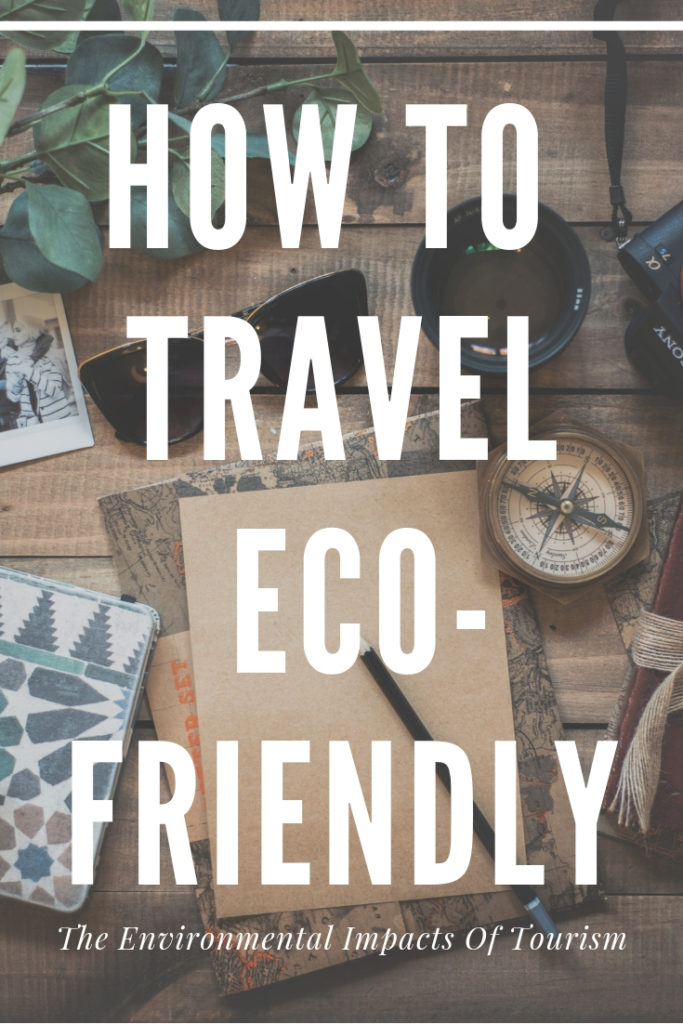
What's In This Article
People are expanding their reasonings behind travel. Now more than ever people want to travel eco-friendly. They care about what individual countries and regions are doing to protect their vulnerable habitats and animals. All of this is affecting their choices in where to visit. Responsible tourism is not a new concept, for decade people have travelled around the world looking at the beauties that this planet has to offer. Deloitte found that the number of travellers who are aware of the sustainable travel issues and the willingness of these travellers to spend on environmentally-friendly travel has increased by a third in the last decade. People are looking for more accountability from countries, sustainable holidays and sustainable travel tips. They are showing an increse awareness of their own individual actions, expanding their reasonings behind their travel and the environmental impacts of tourism.
What are the Environmental Impacts of Tourism?

One of the worlds largest and most complicated industries is the tourism industry. This is mostly due to the in-depth link of tourism with both social, cultural, political and environmental issues.
When looking at the environmental impacts of tourism the most negative effects of tourism take place when the visitors’ environmental usage is more than the environments ability to cope. If it was to continue uncontrolled, tourism poses a significant threat to too many natural areas around the world. These pressures can lead to increase pollution, soil erosion, discharge into the sea, habitat loss and increased pressure on the vulnerability of endangered species all of which we are currently seeing occur.
Tourism currently has a direct impact on factors you may not even consider when travelling.
Freshwater is a factor often overlooked by the modern traveller. Freshwater (Not Salt Water) is actually a critical natural resource. In dryer regions i.e. the Mediterranean where water scarcity can be a particularly important factor. Tourists as a whole can consume more than 440 litres a day almost doubling what the locals would use in an average city for example in Spain.

Those that seek to go on golfing holidays in tropical countries have a larger impact then they might think. An average golf course in a tropical country such as Thailand needs 1500kg of chemical fertilizers, pesticides and herbicides per year and uses as much water as 60,000 rural villagers (Tourism Concern, 2019).
Tourism places direct pressure on local resources, which often are already in short supply. This exploitation of environmental resources
The demand and increase in tourism and recreational facilities
Pollution as a result from tourism is just as damaging if not more than any other industry. Pollution varies from air emissions, noise, solid waste and littering, releases of sewage, oil and chemicals, even architectural/visual pollution.
With regards to just air pollution, one study has estimated that a single transatlantic return flight emits almost half the CO2 emissions produced by all other sources (lighting, heating, car use, etc.) consumed by an average person yearly. (Mayer and Hillman, 1996)
Areas with
What is Responsible Tourism?
The World Tourism Organisation describes Responsible Tourism or Sustainable Tourism as requiring:
The informed participation of all relevant stakeholders, as well as strong political leadership to ensure wide participation and consensus building. Achieving sustainable tourism is a continuous process and it requires constant monitoring of impacts, introducing the necessary preventive and/or corrective measures whenever necessary. Sustainable tourism should also maintain a high level of tourist satisfaction and ensure a meaningful experience to the tourists, raising their awareness about sustainability issues and promoting sustainable tourism practices amongst them.
World Tourism Organization, 2004
Simply put Responsible Tourism is the concept of attempting to make a positive impact on the environment, society and economy when travelling somewhere as a tourist whilst still having a great experience of your trip.
The reason I’ve focused on the world responsible over sustainable is due to its often overuse and the more commonly adopted word of responsible by the industry.

As stated above Responsible Tourism, is any form of tourism that can be experienced or participated in a responsible way:
- Minimizes negative social, economic and environmental impacts
- Generates greater economic benefits for local people and enhances the well-being of host communities
- Improves working conditions and access to the industry
- Involves local people in decisions that affect their lives and life chances
- Makes positive contributions to the conservation of natural and cultural heritage embracing diversity
- Provides more enjoyable experiences for tourists through more
meaninful connections with local people, and a greater understanding of local cultural, social and environmental issues - Provides access for physically challenged people
- Is culturally sensitive, encourages respect between tourists and hosts, and builds local pride and confidence
Eco-Tourism is a form of Responsible Tourism. Ecotourism is about uniting conservation, communities, and sustainable travel. Eco-Tourism aim to directly combat the negative
Conscious Tourism
How to be a socially conscious traveller?
Environmental impacts of tourism don’t necessarily have to be negative. Advocating for responsible travel isn’t about stopping people travelling, or stopping people from having a great experience travelling. It’s about changing the way we think about travel and the impacts we have when travelling. Simply looking for sustainable holidays or sustainable travel tips shows a willingness to travel eco-friendly

Local Businesses
Visiting and supporting local businesses while you travel, is extremely important. Keeping money within the communities you visit, empowers the locals more than you might know. Make them beneficiaries and apart of the tourism experience rather than victims of it. (Sustainable Travel Tip)
Volunteering
Sometimes known as voluntourism and is definitely becoming more popular amongst travellers.
With people expressing a desire to travel and experience a new culture this goes alongside a desire to volunteer. Although both Volunteering and travelling can be great individually, when put together they can often be a risk. Travellers have been known to spend thousands of pounds with most of that going to operators to take part in short term volunteering placements overseas. A lot of companies still have a major focus on their profit margins and don’t give much care about why you may be wanting to volunteer in a particular area as long as they’re making money. It’s up for debate whether many volunteering opportunities bring real benefits to host communities, as many exploit the good intentions of well-meaning volunteers. Placements have been known to prevent local workers from getting

Think before you volunteer
Tourism Concern carried out an independent in-depth report in 2014 covering volunteering overseas. You can read the report here and click here to find ethical volunteering groups. (Sustainable Travel Tip)
Ocean Cruises
Can you think of environmental positives about your ocean cruise? I’m unsure there are any, as If anything they are mass tourism at it’s finest (a.k.a the worst).
Ocean cruises not only pollute the land and sea, they keep money out of the local communities they visit. They have been known to build their own docking islands and even when docking in community ports run their own tours. With an increasing trend towards all-inclusive experiences I truly believe they discourage traveller from having authentic travel experiences and are an ever-growing toxin on the environment and tourism.

Animal welfare
Something I’ve been continually vocal about throughout my writing and social media is Animal welfare and Ethics when It comes to tourism.
One of the main factors I touch on is the disgusting industry that is elephant riding in Asia, however, many other travel actives that potentially include interacting with animals directly or indirectly may not be as responsible as you may believe.

Ethical Destinations
Every year, Ethical Traveler reviews the policies and practices of hundreds of nations in the developing world. They then select the ten that are doing the most impressive job of promoting human rights, preserving the environment, and supporting social welfare—all while creating a lively, community-based tourism industry. By visiting these countries, we can use our economic leverage to reward good works and support best practices. We urge you to explore these destinations and to enjoy the wonderful sights, scenic and cultural, that they have to offer.
2018 list of The World’s Ten Best Ethical Destinations and Best Places to Visit for a Sustainable Vacation
- Belize*
- Benin
- Chile*
- Colombia
- Costa Rica*
- Mongolia*
- Palau
- St. Kitts & Nevis
- Uruguay*
- Vanuatu*
* = also appeared on the 2017 list

Sustainable Travel Tips
- Avoid Planes where possible and take trains. Not only will you experience more of the countries you travel to,
you will significantly reduce your carbon footprint. If Air transport is unavoidable make sure to Carbon Offset your flights. - Say NO to plastic and be part of the solution.
– When possible use your own reusable bottle or opt for locally purified water in recyclable glass bottles. In tropical locales stick to the refreshing coconuts!
– Carry Tote bags to reduce the accumulation of plastic bags on your person and your potential for littering. - Research your tour operators fully (If you are they way inclined)
– Be aware of the companies environmental practices
– Ensure volunteering is carried out through ethical groups - Support the REAL local economy, purchasing locally made goods, craft and souvenirs which may be more expensive but ensures your contribution no matter what size can have a more direct and positive impact.
- DO NOT touch animals (If you are uneducated, unsure or are unaware).
- Avoid ‘exotic cuisines’ that include endangered species i.e. shark fin soup for which 100 million sharks a year are killed.
- Avoid souvenirs from animal products that contribute to mistreatment and declining populations. (anything made from alligators, turtles, snakes and big cats; traditional medicines containing rhino horn, bear bile or tiger bone; and carvings and jewellery from ivory, elephant hair or coral.)
To View the following
Sustainable Travel Products
Well, I hope you guys found this article about the environmental impacts of tourism insightful!
Let me know how to try to travel eco-friendly and the ways in which you may have actively used my sustainable travel tips!
MonkOut.
Pin This Post And Share The Love.



